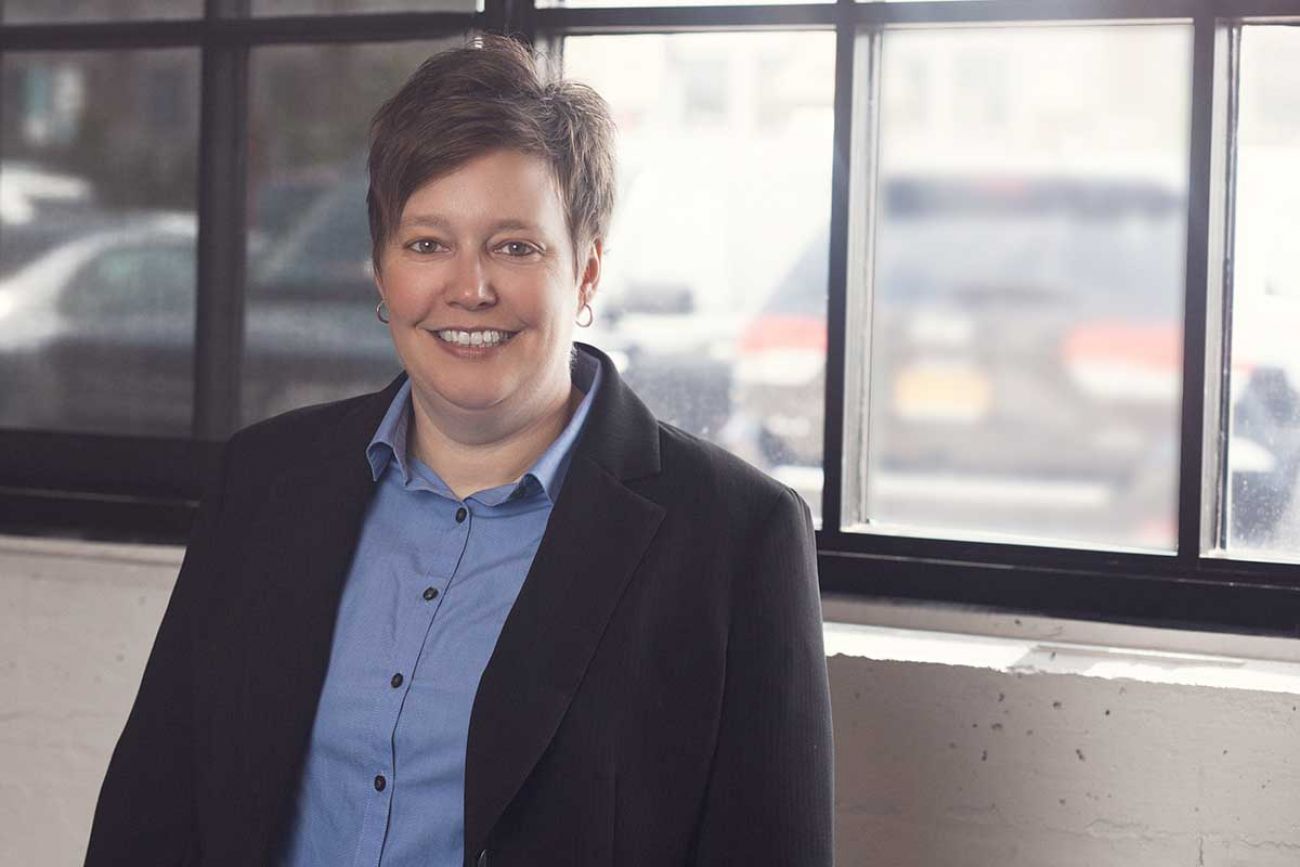Lee Chatfield fought LGBT rights in Lansing. He’s on board in Kalamazoo.

- Update: Lee Chatfield quits Southwest Michigan First amid uproar over his politics
- Jan. 7, 2022: Sister-in-law: Ex-MI House Speaker Lee Chatfield sexually assaulted me as teen
Lee Chatfield’s first official move as CEO of Southwest Michigan First this week was to set a nondiscrimination policy — that included LGBT protections — for his new workplace.
That wasn’t his plan. In fact, much of his first week on the job hasn’t been what he envisioned when he accepted the position, based in Kalamazoo, to guide economic development across seven counties in the southwest corner of the state.
But the Republican, whose political career was launched by opposition to gay marriage, said he is seeing things differently these days.
“That’s not my role anymore,” he told Bridge Michigan.
Chatfield, most recently Republican speaker of the Michigan House of Representatives, left the Legislature in December. During his years as a policy leader, he did not advance bills to add legal protections in the state’s civil rights laws to lesbian, gay, bisexual and transgender residents. That history, along with his anti-gay marriage stance while elected in 2014, generated nearly immediate backlash among Kalamazoo leaders when they learned he’d been hired to represent the region.
Related stories:
- From pastor’s son to power broker, Lee Chatfield takes Lansing
- Michigan LGBT rights initiative launched for November ballot
The city voted to withdraw its support for Southwest Michigan First, Kalamazoo County is reportedly considering the same move, and questions — unanswered so far by the nonprofit’s board of directors — continue to arise over the decision-making process behind the organization’s CEO hire.
But the former top Republican in the state Legislature said he’s listening to the concerns and learning from them, offering the new nondiscrimination policy distributed on Tuesday as evidence.
Chatfield also told Bridge Michigan he now supports efforts, including the Fair and Equal Michigan ballot initiative, to amend the state law to add LGBT anti-discrimination measures.
It’s part of his new job.
“For public policy makers, of which I no longer am, they have a duty to ensure that everyone’s personal, religious and civil liberties are all protected. I always sought to find a way to do that and had many meaningful conversations with some within the LGBT community in Lansing ...to do that,” Chatfield told Bridge in an interview on Wednesday.
“It was a difficult consensus to reach in public policy,” Chatfield said.“The position of this company, which I’m a part of and leading, is that we want to see the Elliott-Larsen Civil Rights Act amended to ensure that everybody’s civil rights are protected equally.”
Chatfield’s new position on anti-gay discrimination legislation is “encouraging,” said Erin Knott, the Kalamazoo city commissioner who led her peers to a 7-0 vote to end support for Southwest Michigan First.
However, Knott, who also is executive director of LGBT advocacy group Equality Michigan, said she wants to see Chatfield move from verbalizing support to actively seeking statewide anti-gay discrimination laws.

“As CEO he is a policy and opinion leader and it is critical that he understands the central importance of attracting and retaining talent to support our region's world class businesses and institutions and the role inclusion plays in those efforts,” Knott said in a statement. “ This is essential to the job Mr. Chatfield was hired to do, and it is incumbent for someone in his position to clearly state what it is he's supporting or not supporting.
"Moving forward, I want to see actual action from” him.
Pushback over community values
Knott told Bridge that she’d tried multiple times to meet with Chatfield while he was in the Legislature as she represented LGBT interests at Equity Michigan, but it didn’t happen until late December, Chatfield’s last month in the House, where he was term-limited from running again.
By then, the Fair and Equal Michigan ballot drive had collected enough signatures to reach the Legislature for approval, or get onto the statewide ballot in 2022. Chatfield, she said, approached her with a question about what compromises she’d accept for it to get into the lame-duck session that month.
“I wanted to see the (proposed) legislation before reacting,” Knott said. “... Ultimately, nothing happened.”
Two months later, Knott said she was shocked to see the announcement that Chatfield had been hired to represent business growth in the region, including Kalamazoo, which contributed about $10,000 per year toward the development group's annual budget that, according to tax filings in 2018, included revenue of $5.4 million.
West Michigan has a reputation for conservatism, Knott said, but employers and major institutions in Kalamazoo serve the LGBT community and recognize their own roles in cultivating an inclusive community.
“They recognize that diversity, equity and inclusion is good for their bottom line,” Knott said.
After Chatfield’s hire, Knott proposed on Monday that the city commission withdraw funding, something that fellow commissioner Chris Praedel supported while saying during the meeting on Monday that the move was “not punitive,” but a reflection of community values.
Knott also set two other goals. The first is getting active support from Southwest Michigan First board members to press state officials to take legislative action.
The board “has a lot of power,” she said. “These are Fortune 500 CEOs. Their voices are heard in Lansing in ways so many of ours aren’t.”
The second is talking to Chatfield more about her concerns. Chatfield, who is making plans to move his family from Northern Michigan to Kalamazoo, said he’s willing to listen and to learn from the experience.
“I’m committed to building the necessary relationships to fulfill this role and help this company grow,” Chatfield said, “just like I did in the Legislature. I regularly worked with people on both sides of the aisle and I formed very meaningful relationships with some people who I disagreed with on various public policy issues. Through the meaningful relationships we understood each other, we learned from each other and I grew from it. I plan on taking that exact same mindset in this role here.”
Chatfield said his anti-gay marriage stance reflected the values of his district in Levering, about 25 miles north of Petoskey.
“I ran for office on multiple issues important to the district I represented,” he said. “My opinions on public policy at that time have no bearing on the role I play here.”
Among the people offering support and a bit of political cover to Chatfield this week was state Attorney General Dana Nessel, a Democrat and first openly gay person elected to statewide office in Michigan.
“Whatever his beliefs were when first arriving in Lansing, @LeeChatfield spent his time in the Michigan Legislature cultivating meaningful, respectful working relationships with me, @JeremyAllenMoss, @JonHoadley and others in the LGBTQ community.”
However, she added in a subsequent Tweet: “It’s long past time for him to recognize that discrimination against Michiganders and our families based on sexual orientation and gender identity is wrong, and that amending (civil rights law) to include these classes is good for Michigan businesses and good for our state.”
Board silence
Southwest Michigan First is among several Michigan regional economic development entities that are publicly and privately funded to work on job attraction efforts. It has a 64-member board of directors, led by Aaron Zeigler, president of Zeigler Automotive Group, who did not respond to an email from Bridge asking about the Chatfield hire. Members include U.S. Rep. Fred Upton, who declined to comment.
The Michigan Economic Development Corporation calls the regional groups it works with “critical partners” for the state’s business growth, and MEDC spokesperson Otie McKinley said that relationship will continue with Southwest Michigan First.
Chatfield replaces Ron Kitchens, who resigned in December after 15 years leading Southwest Michigan First. Kitchen earned about $750,000 per year, according to tax filings. Neither the company nor Chatfield would disclose his pay, but he said it was not as much as Kitchens.
Chatfield said he was hired after working with the Jorgenson Consulting national executive search firm and talking to the Southwest Michigan First search team and individual members of the board.
While he has no experience as an economic developer, Chatfield said his background in Lansing helped him gain similar skills through leading the state House, networking and fund-raising. He was eager to apply them outside of politics, he said.
“I emphasized my desire to be a part of an organization that wants to grow and impact lives in a nonpartisan way,” Chatfield said.
He added: “I instinctively enjoy working with people with different opinions.”
Chatfield, who said he currently has no political ambitions, said he was passionate about business retention and attraction as he crafted legislation in Lansing to encourage economic development.
The board as a whole did not vote on the hire, said Western Michigan University President Edward Montgomery, the only board member to respond among several contacted by Bridge Michigan.
Montgomery acknowledged Chatfield’s hire was not easily accepted in the community, though he said “a diverse and inclusive community will also come with a range of political perspectives.
“We believe the quality of life in our region is enhanced by our LGBTQ community,” Montgomery said in a written statement. “There is no equivocation or backing away from that commitment. We also expect the same of our partners, including Southwest Michigan First. We will judge this partnership not just by what is said but by what is done to promote a vibrant, inclusive community.”
Business leads on LGBT
Questions about Chatfield’s hire come as businesses increasingly recognize LGBT consumers as a powerful economic force and research shows companies with strong LGBT policies tend to innovate the most.
Research from the National Gay & Lesbian Chamber of Commerce said that the buying power from the national LGBT community reached $917 billion in 2015.
Workforce attraction and profitability also play into increased corporate attention, prompting the U.S. Chamber of Commerce Foundation to issue a report in 2019 that outlined routes and reasons for employers to consider their inclusion policies.
“Companies that adopt LGBT-inclusive practices tend to improve their financial standing, and do better than companies that do not adopt them,” it said. “Additionally, employees, regardless of their sexual orientation or gender identity, express greater job satisfaction at companies where these practices are in place.”
However, as of 2019, laws in more than half of the states — including Michigan — did not prohibit employment discrimination based on sexual orientation and gender identity.
“This means that being out as an LGBT individual at work in those states may be grounds for dismissal,” the report said.
Equality Michigan gained support from many leading businesses in Michigan as it pushed to change the state’s civil rights laws for LGBT inclusion. State business leaders advocated for the changes back in 2014, with corporations like Dow Chemical Co. and Whirlpool, which is based in St. Joseph, offering support.
At that time, many were following the lead of Business Leaders for Michigan, a nonprofit and nonpartisan organization focusing on the state’s business climate, The organization underscored its commitment to obtaining LGBT legal protections by contributing $100,000 in 2020 to the Fair and Equal amendment drive.
“A state that allows discrimination based on sexual orientation or gender will never be a Top Ten state,” then-President and CEO Doug Rothwell said at the time. (Editor's note: Rothwell is a board member for the Center for Michigan, BridgeMichigan's parent nonprofit)
Knott, of Equality Michigan, said the business efforts have resulted in real change. Whirlpool employees, for example, were supported by the company as they persuaded St. Joseph in 2019 to join dozens of other Michigan municipalities in expanding nondiscrimination ordinances to include sexual orientation and gender identity protections.
“If you look at anchor institutions and businesses (in Southwest Michigan), you see a lot of support for equity, diversity and inclusion,” Knott said. “I’m proud of our region. We stand up for our people.”
Chatfield said he is up to the challenge. “My work,” he said. “is cut out for me.”
Business Watch
Covering the intersection of business and policy, and informing Michigan employers and workers on the long road back from coronavirus.
- About Business Watch
- Subscribe
- Share tips and questions with Bridge Business Editor Paula Gardner
Thanks to our Business Watch sponsors.
Support Bridge's nonprofit civic journalism. Donate today.
See what new members are saying about why they donated to Bridge Michigan:
- “In order for this information to be accurate and unbiased it must be underwritten by its readers, not by special interests.” - Larry S.
- “Not many other media sources report on the topics Bridge does.” - Susan B.
- “Your journalism is outstanding and rare these days.” - Mark S.
If you want to ensure the future of nonpartisan, nonprofit Michigan journalism, please become a member today. You, too, will be asked why you donated and maybe we'll feature your quote next time!




